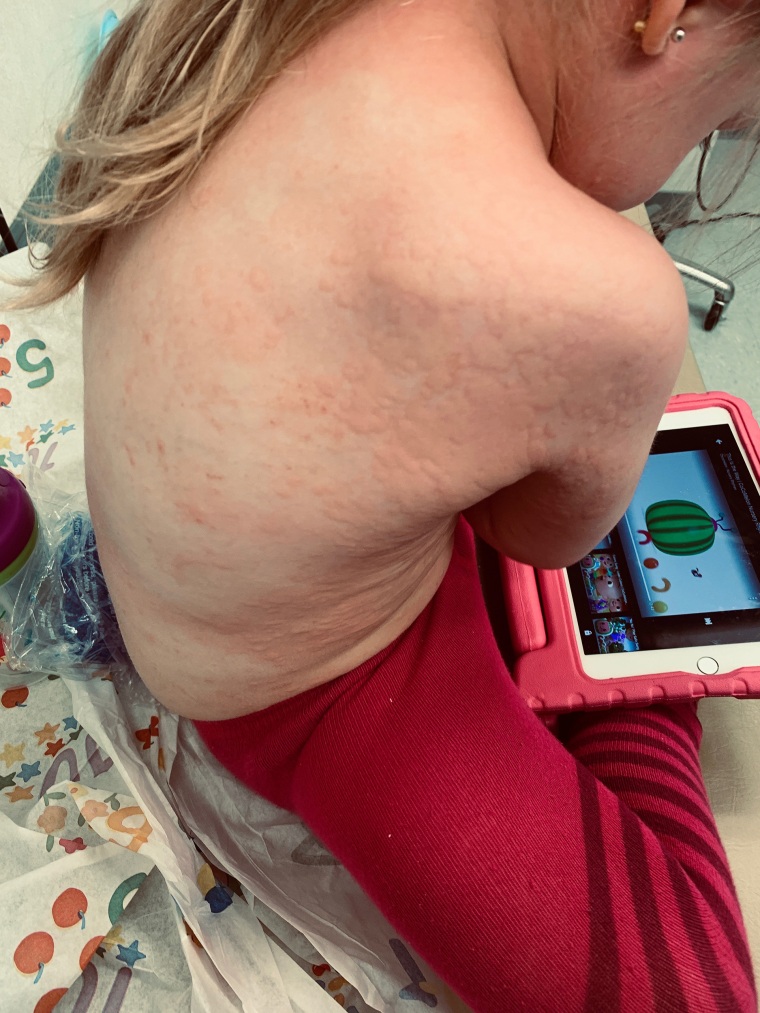What at first seemed like her toddler's mild reaction to cashews in the doctor's office turned into a scary reminder about life-threatening food allergies for her mother, Julie Berghaus.
It started in early March, when Berghaus took her daughter, Maren, to the allergist’s office for a tree-nut challenge, a common practice that determines when someone is allergic to a food. The doctor gave the girl about a tenth of a cashew. While the family knew 3-year-old Maren was allergic to some nuts, she had never eaten a cashew before.
Initially, it seemed like Maren was having a mild reaction as she scratched at her ears. They soon realized she was really experiencing anaphylaxis, even though she wasn't yet showing the typical symptoms, such as difficulty breathing or vomiting. Anaphylaxis is an extreme, potentially fatal allergic reaction which can occur suddenly — within seconds or minutes of exposure to an allergen.
Berghaus shared Maren’s scary experience on Facebook to help others better understand food allergies.
“There was no drama. No nothing. No panic,” Berghaus, 41 of Frisco, Texas, told TODAY. “She was playing on the iPad and scratching with the other hand.”
Even though, Maren was scratching her ears, she did not have a rash or hives. Minutes later, as she began scratching her entire body, she complained that her stomach hurt. The staff gave her an epinephrine shot and a Zyrtec pill to be safe.
Berghaus believes that made all the difference for her daughter.
“They decided to administer her first epi shot at this point, because she was exhibiting 2 symptoms, belly pain and itching,” Berghaus wrote in a Facebook post that has since gone viral.
For about 10 minutes, Maren seemed fine. Then Berghaus noticed hives were covering her body. They gave her a steroid as she kept playing her game. Five minutes later she started coughing. Even though she wasn’t wheezing, a nurse listened to her chest and could tell Maren was struggling to breathe.
“She wasn’t showing any outward signs of what was going on,” Berghaus said. “That’s what was so odd.”

Maren started acting sleepy and then passed out. Staff knew she was having a serious reaction and gave her albuterol, another epinephrine shot and a steroid.
“It only took about 10 minutes to get out of that dangerous zone. It took about two hours to completely get the hives gone,” Berghaus said. “She was fine. She was like nothing ever happened.”
Allergic reactions not always predictable
Berghaus is stunned by how Maren seemingly went from perfectly content to blacked out. She had worked as an operating room nurse and had never witnessed anyone react that way.
“I have never seen a reaction that severe,” she said. “Nothing ever happened like this.”
Experts agree allergic reactions don’t always look the same.
“Your previous reaction isn’t really predictive of what your next reaction will be either in the type or the severity of it,” Dr. Nicholas Hartog, a pediatric allergist at Helen DeVos Children’s Hospital in Grand Rapids, Michigan, who did not treat Maren, told TODAY.

Experts are unsure why symptoms vary from each allergic reaction, but numerous factors play into the severity of the symptoms, Hartog said. Sometimes people are taking an antihistamine that might suppress hives or itching. Having a cold, menstruating, exercise and the amount a person ingested can all impact the seriousness of an allergic reaction.
“All of those are basic thing that happen in your everyday life and any combination of them can alter the severity,” he said.
While two epinephrine shots might seem like a lot, Hartog said they are sometime needed to tackle anaphylaxis.
“A lot of people will need one shot and be fine. Some people will need a second dose and will even need more than that,” Hartog said.
The experience hasn’t slowed Maren down and Berghaus hopes others learn from this.
“Please if you are one of the people that cares for my child or spends time with her, be careful what you eat around her, what you give her, and DON’T be afraid to give epi. She had zero side effects from the epi. It could save her life,” Berghaus wrote.